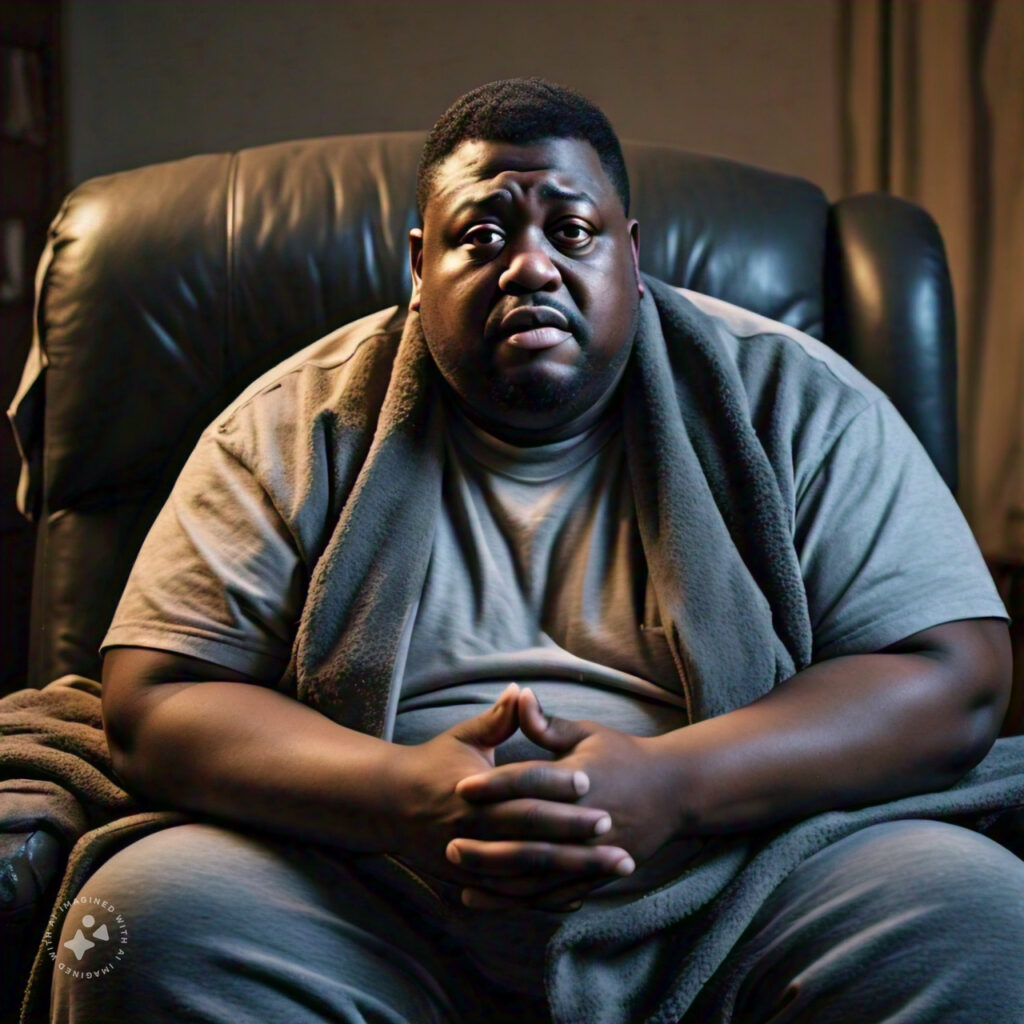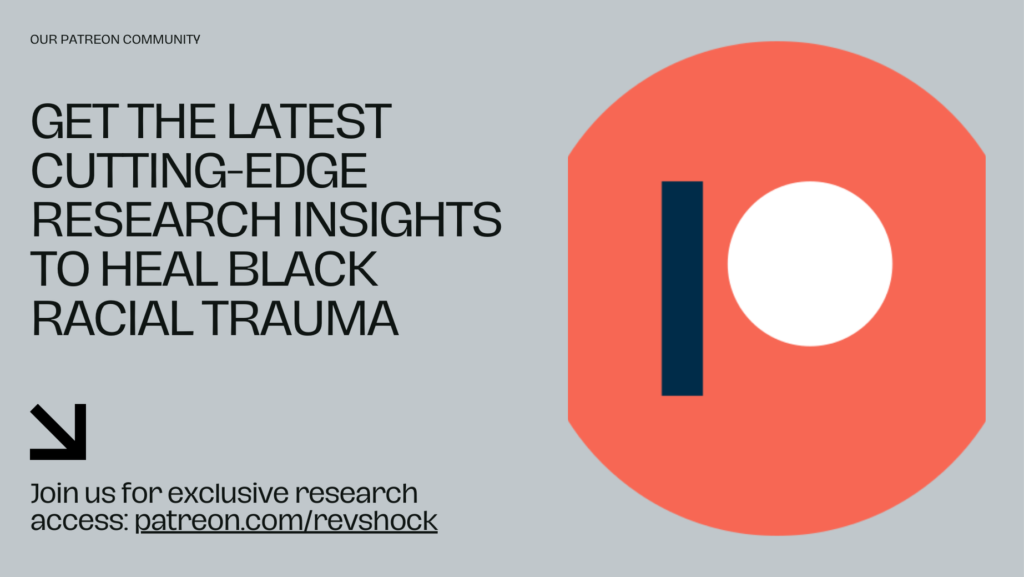
Powered By BlackTraumaGPT.com
Researched and Curated By Rev. Dr. Philippe SHOCK Matthews
(Black Trauma and Mental Health Specialist | Prompt Eng | GPT Dev | Research Scientist | Africana Phenomenologist | Black AI Corsortim co-Founder | Black Mental Health Podcast Host)

Unfortunately community, the phrase “It’s not what you eat, it’s what’s eating you” can be applied to the issue of morbid obesity in America, particularly when looking at the psychological and emotional roots behind overeating and disordered eating patterns. This saying underscores the idea that underlying emotional, psychological, or social factors often drive excessive eating or unhealthy relationships with food rather than food itself being the primary problem.
Obesity in America, especially among marginalized communities like Black and brown populations, is linked to several interrelated factors, including trauma, stress, poverty, and systemic inequities that contribute to unhealthy coping mechanisms, such as overeating. Here are key elements connecting this phrase to obesity:
1. Trauma and Emotional Eating
Many people use food as a way to cope with emotional pain, unresolved trauma, or stress. In particular, emotional eating occurs when individuals eat to manage negative emotions like sadness, anxiety, or anger rather than out of hunger. Black scholars have discussed how trauma lives in the body and can manifest in various coping mechanisms, including disordered eating behaviors.
For individuals who have experienced trauma—whether from childhood abuse, systemic racism, or chronic stress—eating may become a way to soothe emotional wounds. In this sense, what’s “eating” the person (stress, depression, unresolved trauma) drives their eating habits, contributing to obesity.
2. Stress, Racism, and Food Insecurity
Particularly within Black and marginalized communities, stress related to systemic racism, economic inequality, and discrimination plays a significant role in obesity rates. The term “John Henryism“ refers to the high-effort coping with racial oppression and societal barriers that disproportionately affect Black Americans. This stress often leads to emotional and physiological responses that contribute to weight gain, including reliance on food for comfort.
In addition, food deserts and a lack of access to nutritious, affordable food in many low-income and Black neighborhoods make it harder for people to maintain healthy diets. The stress of poverty, combined with easy access to cheap, unhealthy food, contributes to higher obesity rates.
3. Cultural and Psychological Factors
From a psychological perspective, morbid obesity can sometimes result from using food as a way to fill emotional voids, manage past trauma, or protect oneself from perceived external threats. For some, gaining weight may serve as a defense mechanism—unconsciously or consciously—as a way to avoid attention or make oneself less vulnerable.
This is where the connection to the phrase becomes more relevant: the weight gain isn’t simply about the act of eating, but about what drives the person to overeat. It’s often unresolved pain, isolation, or societal pressures eating away at the individual.
4. Systemic Inequities and Health Outcomes
The obesity epidemic in America, particularly among Black and Latinx communities, highlights the structural inequities that impact health. The stress of living under systemic oppression—whether from racism, economic instability, or limited access to healthcare—can lead to chronic health problems, including obesity. Scholars have linked these stressors to what is known as Post-Traumatic Slave Syndrome (PTSS), which underscores how generational trauma influences health behaviors and outcomes in Black communities today.
Thus, in the context of morbid obesity, the phrase “It’s not what you eat, it’s what’s eating you” can be understood as pointing to deeper psychological, emotional, and societal issues driving unhealthy eating habits and contributing to obesity. Addressing these issues requires a holistic approach, incorporating mental health care, trauma-informed practices, community support, and policy changes that address food insecurity and racial disparities in healthcare.
READ PART 1: Racial Trauma Can Make Black People FAT!? – p1 https://t.ly/3wo8v
If nothing is wrong with you and something happened to you…are you ready to find out what to do about it? Shock Trauma Spiritual Counseling Discovery Call https://t.ly/VJWqJ | BlackTraumaGPT.com: Beginner’s User Guide https://t.ly/HtHMX | Programming chatGPT for Black Self Mental Health, Trauma, and Healing https://amzn.to/47P8MXK
Enjoying Our Content?
Become a member of our Patreon to get the latest research on Racial Black Trauma ! https://www.patreon.com/revshock. Or buy Rev. SHOCK a Coffee! https://bit.ly/3yg5D7A


Book A Discovery Call
Are you ready to SHOCKtrauma? Click HERE now to book a discovery call with Rev. Dr. Philippe SHOCK Matthews

Get Social with Doc SHOCK:
PATREON: https://t.ly/mjksf | REV. DR. SHOCK (PERPLEXITY PAGE): https://t.ly/ppjwh | SOLO: https://solo.to/revshock | BIO: https://t.ly/Ko_y_ | BLOG: https://t.ly/j6bh0 | PODCAST: https://t.ly/cB5GD | ENDORSEMENT: https://t.ly/jFErO | THREADS: https://t.ly/SoKkT | IG: https://t.ly/XsN8f | FB: https://t.ly/R3r9Y | X: https://t.ly/iJ-wy | LINKEDIN: https://t.ly/GZ0pe | TIKTOK: https://t.ly/zfp60 | BLACK TRAUMA GPT: https://t.ly/vswbs | BLACK AI CONSORTIUM: https://t.ly/uiRZN | BOOKS BY PM: https://t.ly/vvHMd
